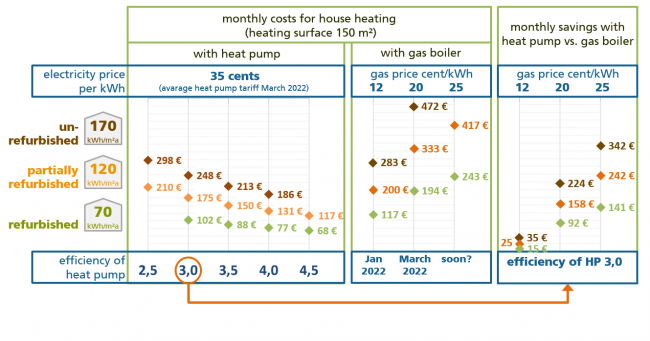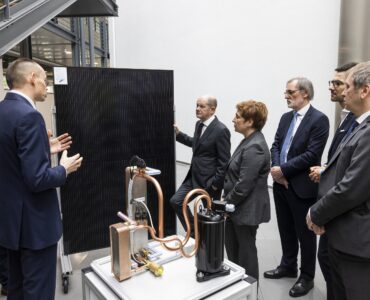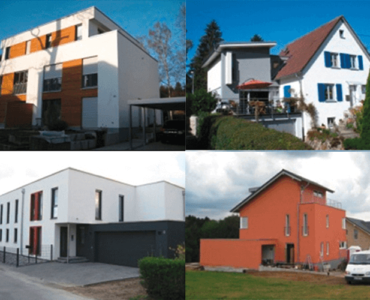Episode 13 of the blog series “heat pumps in existing buildings” on the current discussion on energy independence
It’s never been clearer: we need to stop using fossil fuels, or at least significantly reduce them in the short term. The most important argument for doing so is mitigating the effects of climate change. The latest IPCC report leaves no room for illusions – life on our planet as we know and are used to it will otherwise no longer be possible. The consequences of “business as usual” would be dramatic. In order to achieve the climate targets, we must deploy the whole range of suitable and available solutions with immediate effect. Heat pumps are a key technology in this respect.
The second important aspect we are currently experiencing is cruel geopolitical reality. The horrible war in Ukraine has made our dependence on fossil fuels and their effects abundantly clear to us. Even if we in Germany do not have to fear for our lives, the high and still rising energy costs represent a major economic problem for many citizens. This has led to a broad public discussion about energy independence.
Isn’t heating with heat pumps too expensive?
I asked this question a year ago in an earlier blog post. At the time, I wrote: “However ecologically sound a technology may be, it will only gain acceptance if it brings economic benefits to its users. The technology must pay off for the consumer.” This was followed by an analysis of the operating costs of a heat pump compared to a gas boiler.
The perception of heat pump technology has changed significantly in the meantime. At the latest since Federal Minister Robert Habeck, announced his goals that 4-6 million heat pumps should be installed in Germany by 2030 and that every new heating system should be powered by at least 65% renewable energy as early as 2025, it is clear: the heat pump will be “the dominant technology” for heating homes in the future. And the politicians are serious about this now.
Not much had changed in the price of electricity last year. The average heat pump tariff was 24 ct/kWh in 2021, just as it was in 2020. Recently, though, there has been a significant rise. Today (as of the end of March 22), the average heat pump tariff is about 35 ct/kWh, with strong regional differences. In perspective, there is a chance that the electricity price will decrease due to the planned abolition of the EEG levy. However, in view of the tense situation on the energy market, it can be assumed that these savings will unfortunately be offset elsewhere due to rising costs.
There has also been a dramatic rise in the gas price. According to the German Association of Energy and Water Industries (BDEW), the average price for a kilowatt hour (kWh) of gas in Germany was 12.21 ct/kWh for a household in a single-family home at the beginning of 2022. This represents an increase of 73% compared to the previous year. Since the start of the Russian invasion of Ukraine, prices have once again risen sharply to around 20 ct/kWh on March 20, 2022.
These figures massively change the economic consideration of the operating costs of heat pumps.
Comparison of operating costs
The following graph shows the monthly heating costs for houses with different energy standards (not renovated, partially renovated and renovated), heated with a heat pump or a gas boiler. For the heat pump, the calculation is based on the current average heat pump tariff in Germany of 35 cents. The monthly costs are shown depending on the efficiency of the heat pump. For the gas price, the January 2022 price of 12 ct/kWh, the mid-March 2022 price of 20 ct/kWh, and a hypothetical price of 25 ct/kWh, which cannot be ruled out in the short and medium term, were assumed.

Compared to the analysis in last year’s blog post, the scale had to be adjusted: The monthly costs for heating with gas boiler simply did not fit into the diagram. Even with the heat pump with the poor efficiency value of 2.5 and the “favorable” gas price of January 2022, the operating costs with a heat pump are lower than with a gas boiler. As a reminder, taking into account the gas prices of 2020 in Germany, a heat pump would have to reach at least an efficiency of 3.5 to have approximately the same operating costs as a gas boiler.
In order to directly assess the differences in today’s situation, I added the right hand column (monthly savings with a heat pump versus a gas boiler) to the graph. The values were calculated for different gas prices and a conservatively assumed heat pump efficiency of 3.0. Even today, the savings are in the range of €92 to €224 per month. Calculations with a hypothetical – but not improbable – gas price of 25 ct/kWh, show savings with a heat pump up to 4000 € per year.
As a result of the gas price development described above, many customers are currently canceling their gas boiler orders and opting for a heat pump. This exacerbates the already tight installation situation. Not only is it much more difficult to get a heat pump system installed in the short term, but the installation costs more. In my opinion, too much. It is to be hoped that increasingly, installers of gas heating will switch to the installation of heat pumps. There have never been better conditions than now to take this step. In the long term, we can expect technological developments that will simplify the installation of the heat pump and thus reduce the installation time.
And one more reading recommendation at the end: Cambridge Econometrics has just published an extensive study on the comparison of the different energy future scenarios. The results confirm once again: the switch to electrification of heat supply with heat pumps and high-efficiency buildings will bring the greatest socio-economic benefits for Europe. Thus, the rule is: better to switch to heat pumps today than tomorrow. This is true for installers, but also for end users.
Further reading:
Overview on the range of applications for heat pumps.
All posts of the blog series on “heat pumps in existing buildings”
Header image: Tim Reckmann | ccnull.de | CC-BY 2.0


















Your information is really awesome as well as excellent and I got more interesting information from your blog.